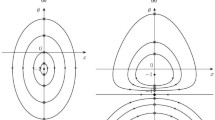Abstract
The problem of the synthesis of proportional-integrating (PI) and proportional-integral-differentiating (PID) controllers in a nonstandard formulation is considered. For a linear one-dimensional control object with nonzero initial conditions, it is required to find a controller that is optimal in the sense of a quadratic functional of the state of the object with a regularization additive in control. The synthesis procedure is a solution of the corresponding quadratic optimization problem using a method similar to the conjugate gradient method (the direction at each step is calculated by the conjugate gradient method, and the step length is calculated by the Armijo rule). Numerical examples illustrate the effectiveness of the proposed algorithm in the synthesis of controllers for models of control objects that are common in practice.

Similar content being viewed by others
REFERENCES
J. C. Maxwell, “On governors,” Proc. R. Soc. London 16, 270–283 (1868).
M. A. Aizerman, “Brief overview of the rise and development of the classical theory of regulation and control,” Avtom. Telemekh., No. 7, 6–18 (1993).
J. G. Ziegler and N. B. Nichols, “Optimum settings for automatic controllers,” Trans. ASME 64, 759–768 (1942).
K. J. Åström and T. Hägglund, Advanced PID Control (ISA, Research Triangle Park, N.C., 2006).
A. Visioli, Practical PID Control (Springer, London, 2006).
L. Wang, PID Control System Design and Automatic Tuning using MATLAB/Simulink (Wiley-IEEE Press, 2020).
A. O’Dwyer, Handbook of PI and PID Controller Tuning Rules (Imperial College Press, London, 2009).
A. G. Aleksandrov and M. V. Palenov, “Adaptive PID controllers: State of the art and development prospects,” Autom. Remote Control (Engl. Transl.) 75 (2), 188–199 (2014).
I. Podlubny, “Fractional-order systems and PI λ D μ-controllers,” IEEE Trans. Autom. Control 44 (1), 208–214 (1999).
M. Hast, K. J. Åström, B. Bernhardsson, and S. Boyd, “PID design by convex–concave optimization,” in Proc. Eur. Control Conf. (ECC-2013), Zurich, Switzerland, 2013, pp. 4460–4465.
S. Han, L. H. Keel, and S. P. Bhattacharyya, “PID controller design with an H ∞ criterion,” IFAC PapersOnLine 51 (4), 400–405 (2018).
Q.-G. Wang, Z. Ye, W.-J. Cai, and C.-C. Hang, PID Control for Multivariable Processes (Springer, Berlin, 2008).
S. Boyd, M. Hast, and K. J. Åström, “MIMO PID tuning via iterated LMI restriction,” Int. J. Robust Nonlinear Control 26, 1718–1731 (2016).
H. Kwakernaak and R. Sivan, Linear Optimal Control Systems (Wiley-Interscience, London, 1972).
B. D. O. Anderson and J. B. Moore, Optimal Control. Linear Quadratic Methods (Prentice-Hall, New Jersey, 1989).
I. Fatkhullin and B. Polyak, “Optimizing static linear feedback: Gradient method,” SIAM J. Control Opt. 59 (51), 3887–3911 (2021).
B. T. Polyak and M. V. Khlebnikov, “New criteria for tuning PID controllers,” Avtom. Telemekh., No. 11, 62–82 (2022).
B. T. Polyak, Introduction to Optimization (Nauka, Moscow, 1983) [in Russian].
L. Armijo, “Minimization of functions having Lipschitz continuous first partial derivatives,” Pac. J. Math. 16 (1), 1–3 (1966).
B. T. Polyak, M. V. Khlebnikov, and P. S. Shcherbakov, Control of Linear Systems Under External Disturbances: The Technique of Linear Matrix Inequalities (LENAND, Moscow, 2014) [in Russian].
D. P. Kim, Theory of Automatic Control, Vol. 2: Multidimensional, Nonlinear, Optimal, and Adaptive Systems (Fizmatlit, Moscow, 2004) [in Russian].
K. J. Åström and T. Hägglund, “Benchmark systems for PID control,” IFAC Proc. Vol. 33 (4), 165–166 (2000).
K. J. Åström, “Limitations on control system performance,” Eur. J. Control 6 (1), 2–20 (2000).
Funding
This work was partially supported by the Russian Science Foundation, project no. 21-71-30005.
Author information
Authors and Affiliations
Corresponding author
Ethics declarations
The author declares that he has no conflicts of interest.
Additional information
Publisher’s Note.
Pleiades Publishing remains neutral with regard to jurisdictional claims in published maps and institutional affiliations.
Rights and permissions
About this article
Cite this article
Shatov, D.V. Synthesis of Parameters of Proportionally-Integral and Proportionally-Integral-Differential Controllers for Stationary Linear Objects with Nonzero Initial Conditions. J. Comput. Syst. Sci. Int. 62, 17–26 (2023). https://doi.org/10.1134/S1064230723010082
Received:
Revised:
Accepted:
Published:
Issue Date:
DOI: https://doi.org/10.1134/S1064230723010082




